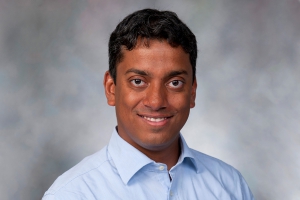-
Center of Autonomy and AI, Center for Cyber-Physical Systems and the Internet of Things, and Ming Hsieh Institute Seminar Series

Wed, Mar 09, 2022 @ 02:00 PM - 03:00 PM
Ming Hsieh Department of Electrical and Computer Engineering
Conferences, Lectures, & Seminars
Speaker: Swarat Chaudhuri, Computer Science Department, The University of Texas at Austin
Talk Title: Neurosymbolic Programming
Series: Center for Cyber-Physical Systems and Internet of Things
Abstract: I will speak about Neurosymbolic programming, an emerging research area that bridges the fields of deep learning and program synthesis. Like in classic machine learning, the goal here is to learn functions from data. However, these functions are represented as programs that can use neural modules in addition to symbolic primitives and are induced using a combination of symbolic search and gradient-based optimization. Neurosymbolic programming can offer multiple advantages over end-to-end deep learning. Programs can sometimes naturally represent long-horizon, procedural tasks that are difficult to perform using deep networks. Neurosymbolic representations are also, commonly, easier to interpret and formally verify than neural networks. The restrictions of a programming language can serve as a form of regularization and lead to more generalizable and data-efficient learning. Compositional programming abstractions can also be a natural way of reusing learned modules across learning tasks.
In the talk, I will illustrate some of the potential benefits of research in this area. I will also categorize the main ways in which symbolic and neural learning techniques come together here. I will conclude with a discussion of the open technical challenges in the field.
Biography: Swarat Chaudhuri (http://www.cs.utexas.edu/~swarat) is an Associate Professor of Computer Science and the director of the Trishul laboratory at UT Austin. His research lies at the interface of programming languages, logic, and machine learning. Through a synthesis of ideas from these areas, he seeks to develop a new generation of intelligent systems that are designed to be reliable, transparent, secure, and that can solve complex procedural tasks beyond the scope of contemporary AI.
Host: Pierluigi Nuzzo
Webcast: https://usc.zoom.us/webinar/register/WN_zyIBh_1gQLmKpMJG0GyLxwLocation: Online
WebCast Link: https://usc.zoom.us/webinar/register/WN_zyIBh_1gQLmKpMJG0GyLxw
Audiences: Everyone Is Invited
Contact: Talyia White
This event is open to all eligible individuals. USC Viterbi operates all of its activities consistent with the University's Notice of Non-Discrimination. Eligibility is not determined based on race, sex, ethnicity, sexual orientation, or any other prohibited factor.




